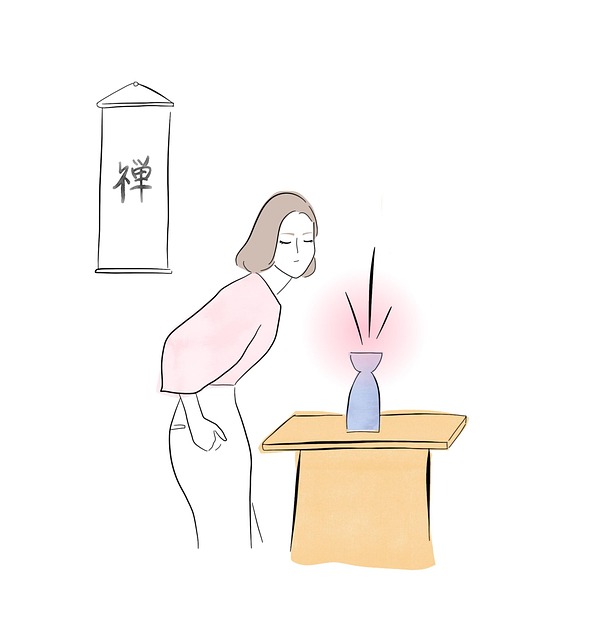Mindfulness meditation is a compassionate therapy for adolescent teens facing terminal illnesses, offering present-moment awareness and non-judgmental thought observation through tailored exercises. Specialized workshops and one-on-one sessions equip teens with stress management techniques and mental wellness journaling skills, fostering resilience. Cultural competency training ensures sensitive support. For academic pressures and social media influences, mindfulness meditation enhances mental well-being, encouraging present-moment awareness, calmness, and better coping strategies. A quiet, comfortable environment with consistent daily routines improves meditation experiences, leading to self-esteem improvement and deeper self-connection. This holistic approach provides comprehensive care, supporting teens' emotional well-being and empowering them to navigate their illness with courage and peace.
Mindfulness meditation offers a powerful tool for adolescent teens facing terminal illnesses, providing a sanctuary from stress and anxiety. This article guides parents and caregivers through implementing mindfulness as therapeutic support. We explore its benefits in coping with challenging emotions, offering practical tips for creating calming environments conducive to practice. From techniques for effective sessions to integrating mindfulness into daily routines, discover strategies to enhance quality of life. Learn how this ancient practice can be a modern game-changer for adolescents navigating their health journey.
- Understanding Mindfulness Meditation for Teens with Terminal Illness
- The Benefits of Mindfulness in Coping with Stress and Anxiety
- Creating a Supportive Environment for Practice
- Techniques and Exercises for Effective Meditation Sessions
- Integrating Mindfulness into Daily Life: A Long-Term Approach
Understanding Mindfulness Meditation for Teens with Terminal Illness

Mindfulness meditation offers a unique and valuable approach to supporting adolescent teens with terminal illnesses in managing their mental wellness. This ancient practice encourages individuals to focus on the present moment, cultivating awareness without judgment. For teens facing challenging health conditions, mindfulness can serve as a powerful tool for coping with anxiety, stress, and emotional turmoil. By guiding them through controlled breathing exercises and non-judgmental observation of thoughts and feelings, mindfulness meditation promotes mental clarity and emotional balance.
Incorporating mindfulness into their daily routines allows these young individuals to develop a deeper sense of self-awareness and compassion. Healthcare providers play a crucial role in facilitating this process by offering tailored guidance and creating safe spaces for practice. Through specialized workshops or one-on-one sessions, teens can learn effective mental wellness journaling exercises and stress management techniques, empowering them to navigate their illness with resilience. Additionally, providing healthcare provider cultural competency training ensures that support is delivered with empathy and understanding, catering to the unique needs of each teen and their families.
The Benefits of Mindfulness in Coping with Stress and Anxiety

Mindfulness meditation has emerged as a powerful tool to combat stress and anxiety, offering significant benefits for both mental and emotional well-being. In today’s fast-paced world, where adolescent teens often face various challenges, from academic pressures to social media influences, mindfulness provides a much-needed respite. This ancient practice encourages individuals to focus on the present moment, cultivating a sense of calm and awareness that can effectively manage stress responses. By training their minds to observe thoughts and emotions without judgment, teens can develop better coping strategies, enhancing their overall mental resilience.
For those facing terminal illness or navigating life’s difficulties, mindfulness meditation acts as a form of therapy, promoting self-esteem improvement and fostering a deeper connection with oneself. Various mental wellness coaching programs and development initiatives have incorporated mindfulness techniques to support individuals in finding inner peace and improving their quality of life. Moreover, engaging in activities like the production of mental wellness podcast series can be a creative outlet for sharing mindfulness practices, reaching out to a broader audience and potentially alleviating societal stress and anxiety.
Creating a Supportive Environment for Practice

Creating a supportive environment is essential for any mindfulness meditation practice, especially for adolescent teens facing terminal illness. A calm and peaceful space free from distractions can significantly enhance their experience and promote healing. Encourage them to choose a quiet area where they feel comfortable and safe; this could be their bedroom or a dedicated meditation corner in your home. Soft lighting, comfortable seating, and perhaps some soothing scents or music can all contribute to an atmosphere that fosters relaxation and mindfulness.
This practice is not only about the physical space but also setting a routine. Consistency is key to building resilience, so suggest a regular time each day for meditation. Whether it’s first thing in the morning or before bedtime, a fixed schedule can help teens develop a sense of control and promote depression prevention. In light of their challenges, mindfulness can be a powerful tool to enhance their overall well-being and build resilience, as evidenced by public awareness campaigns development aimed at supporting young people through difficult circumstances.
Techniques and Exercises for Effective Meditation Sessions

Meditation sessions can be incredibly beneficial for adolescent teens facing terminal illness or navigating their emotional well-being. There are various techniques and exercises to enhance each practice, ensuring a more profound and effective experience. One powerful method is mindfulness meditation, which encourages individuals to focus on the present moment, observing thoughts and sensations without judgment. This practice helps in reducing anxiety and stress, often associated with serious health conditions.
Incorporating simple breathing exercises, such as deep abdominal breathing or guided visualizations, can make meditation more accessible and enjoyable for teens. These techniques promote relaxation and provide a sense of calm, which is particularly useful in preventing burnout, a common issue faced by those supporting terminally ill adolescents. Regular meditation practice also contributes to mental wellness, offering a moment of peace amidst the challenges, and may even inspire the production of a mental wellness podcast series tailored to their experiences.
Integrating Mindfulness into Daily Life: A Long-Term Approach

Integrating mindfulness into daily life is a long-term approach that offers sustainable benefits for overall well-being. It’s not just about finding a few minutes each day to sit in silence; it’s about cultivating a mindful mindset that permeates every aspect of our lives, much like a gentle current guiding us through the ebb and flow of daily experiences. This involves being present with our thoughts and emotions without judgment, paying attention to the sensory details around us, and fostering a sense of calm and clarity in even the most challenging situations.
For adolescent teens facing terminal illness or other significant challenges, mindfulness therapy can serve as a powerful tool for stress management and trauma support services. By integrating mindfulness practices into their daily routines, these individuals learn to navigate their experiences with greater resilience and cultural sensitivity in mental healthcare practice. This holistic approach not only enhances their quality of life but also empowers them to face the future with courage and peace.
Mindfulness meditation offers a powerful tool for adolescent teens facing terminal illness, providing a means to navigate stress, anxiety, and life’s challenges with greater ease. By creating a supportive environment, employing effective techniques, and integrating mindfulness into daily routines, teens can experience the profound benefits of this therapy, fostering resilience and enhancing their overall well-being. This holistic approach not only addresses immediate concerns but also equips individuals with valuable coping mechanisms for a long-term, positive impact.











